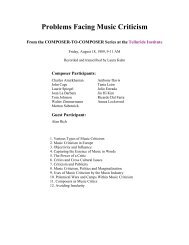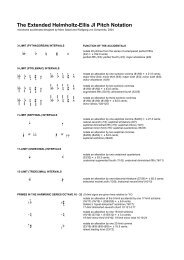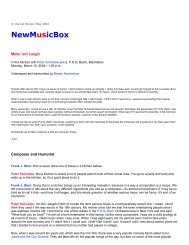Sixth World Symposium on Choral Music ... - NewMusicBox
Sixth World Symposium on Choral Music ... - NewMusicBox
Sixth World Symposium on Choral Music ... - NewMusicBox
Create successful ePaper yourself
Turn your PDF publications into a flip-book with our unique Google optimized e-Paper software.
New<strong>Music</strong>Box May 2003<br />
6. Working With Composers You Commissi<strong>on</strong><br />
LINDA HOESCHLER: It is delightful to be with all of you here today. I come at this<br />
moderati<strong>on</strong> from both a pers<strong>on</strong>al and professi<strong>on</strong>al passi<strong>on</strong>—probably <strong>on</strong>e stems from the other.<br />
For the last 25 years, my husband and I have been privately commissi<strong>on</strong>ing music. We have<br />
commissi<strong>on</strong>ed three to five pieces of music a year. Many times we get the privilege of working<br />
with choral composers. For about the last 11 years, I have been Executive Director of American<br />
Composers Forum, which Libby Larsen and Stephen Paulus founded about 35 years ago. So, this<br />
is an opportunity for us to get to know composers whom I dearly love working with and find<br />
great joy experiencing and participating in their creative process. Hopefully today we will learn a<br />
little bit about how they approach their music, and then how best to perhaps work with<br />
composers when you are commissi<strong>on</strong>ing them, or if you are performing a new work of theirs and<br />
want some guidance from them about the pieces. So, we just heard Moses Hogan's piece a couple<br />
of hours ago, which is w<strong>on</strong>derful, d<strong>on</strong>e by the Michigan State Children's Choir. A very<br />
impressive piece, Moses! Why d<strong>on</strong>'t you talk to us about the text, the group, how you write<br />
differently for children…<br />
MOSES HOGAN: This is a unique tribute, challenge, I would say. Philip asked me, "Moses, we<br />
would like you to do something a little different in terms of your normal musical offering." And I<br />
said, "Well, you know, Philip, I have made a vow to at some level preserve the spiritual." And he<br />
said, "Well, that's very nice. We would like you to write something with a sort of a gospel<br />
flavor." Well, certainly I am not at all opposed to gospel music, as it was part of my early<br />
upbringing. I grew up playing in a Baptist church. I started playing at a very early age. And as<br />
matter of fact, my father relates that I was talented when I was very young, so I thought I was<br />
playing by ear, because they said, "Oh, he's so talented, he plays by ear!" It's a Southern thing!<br />
But, that was my initial exposure to music. And so, I have never had the opportunity to<br />
document a written-out gospel arrangement and I thought that this was quite unique, having this<br />
be my first compositi<strong>on</strong> with a gospel flavor to it. But I have a great passi<strong>on</strong> for the spiritual, as<br />
you know, if some of you have d<strong>on</strong>e some of my spiritual arrangements. So I thought this was a<br />
w<strong>on</strong>derful opportunity to educate, because many times as I travel around and I listen to people<br />
use the term "spiritual" and "gospel" interchangeably, and obviously, you know, there is a<br />
historical difference. We make every effort in classical music which I love, to let people know<br />
what the Renaissance period embraces in years, and then the Baroque period, and then the<br />
Classical period, and so forth as we talk about music history. But we tend now to group all of the<br />
African American music in <strong>on</strong>e category—we want to call it all gospel music. And so what I<br />
decided to do with this, I introduced this gospel compositi<strong>on</strong> with a spiritual, a very famous<br />
spiritual entitled, "Over My Head I Hear <strong>Music</strong> in the Air." And it would give music educators<br />
the opportunity, hopefully, not to just sing the s<strong>on</strong>g because there is a nice groove to it, but to<br />
use it also as a historical less<strong>on</strong>, to talk about the spirituals, and how the spirituals influenced<br />
jazz and how the spirituals influenced the blues and ragtime and gospel music. And to give our<br />
young people, who are basically <strong>on</strong>ly familiar with gospel music, a real history less<strong>on</strong>. And so, I<br />
took the text of the old, "Over my head, I hear music in the air. There must be a God<br />
somewhere," and I used a couple of verses from that text, and then I reflected <strong>on</strong> what those<br />
Composers’ Dialogue #1, 08/06/2002





